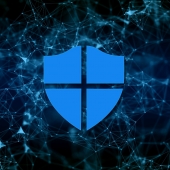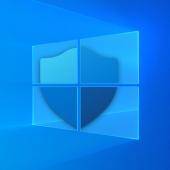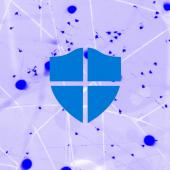-
German government advises against using Kaspersky antivirus
BSI, the federal cybersecurity authority in Germany, has issued a public statement to warn critical entities in the country against using Kaspersky antivirus software products.
- March 15, 2022
- 10:15 AM
 5
5
-
Fake antivirus updates used to deploy Cobalt Strike in Ukraine
Ukraine's Computer Emergency Response Team is warning that threat actors are distributing fake Windows antivirus updates that install Cobalt Strike and other malware.
- March 14, 2022
- 05:52 PM
 0
0
-
ESET antivirus bug let attackers gain Windows SYSTEM privileges
Slovak internet security firm ESET released security fixes to address a high severity local privilege escalation vulnerability affecting multiple products on systems running Windows 10 and later or Windows Server 2016 and above.
- February 02, 2022
- 05:00 PM
 0
0
-
The Best Cyber Monday 2021 Security, IT, VPN, & Antivirus Deals
Cyber Monday is almost here and there are already great deals available for computer security, software, online courses, system admin services, antivirus, and VPN software
- November 27, 2021
- 01:20 PM
 0
0
-
Black Friday Deal: Emsisoft Anti-malware on 3-devices for price of 1
Emsisoft's Cyber Week deal is live with a 3-device license for the price of 1 offer for Emsisoft Anti-Malware, Business Security, or Enterprise Security.
- November 24, 2021
- 02:47 PM
 0
0
-
Black Friday 2021 Deal: 60% off Malwarebytes Premium
Malwarebytes's Black Friday deals are live with 60% off Malwarebytes Premium and 50% off the Malwarebytes Premium + Privacy.
- November 22, 2021
- 12:34 PM
 0
0
-
Microsoft Defender for Windows is getting a massive overhaul
Microsoft Defender for Windows is getting a massive overhaul allowing home network admins to deploy Android, iOS, and Mac clients to monitor antivirus, phishing, compromised passwords, and identity theft alerts from a single security dashboard.
- November 01, 2021
- 05:35 PM
 0
0
-
Android spyware spreading as antivirus software in Japan
A new variant of the Android info-stealer called FakeCop has been spotted by Japanese security researchers, who warn that the distribution of the malicious APK is picking up pace.
- October 28, 2021
- 12:31 PM
 0
0
-
Fake Amnesty International Pegasus scanner used to infect Windows
Threat actors are trying to capitalize on the recent revelations on Pegasus spyware from Amnesty International to drop a less-known remote access tool called Sarwent.
- September 30, 2021
- 03:32 PM
 0
0
-
Sponsored Content
Modern cyber protection: The digital must-have for home users
Digital advances have reinvented how most of us work, organize our lives, and communicate with friends. As individuals, we're more dependent on data than at any time in history, which means protecting the data, applications, and systems we rely on is a serious concern.
- September 22, 2021
- 10:00 AM
 0
0
-
Antivirus creator John McAfee reportedly found dead in prison cell
Former antivirus software creator John McAfee has died in what is reported to be a suicide as he waited for extradition to face tax evasion charges in the USA.
- June 23, 2021
- 04:41 PM
 8
8
-
Hands on with Norton antivirus Ethereum mining: The good and the bad
Last week, NortonLifelock announced that the Norton 360 antivirus suite would soon be able to mine Ethereum cryptocurrency while the computer is idle. In this article, we go hands-on with the new 'Norton Crypto' feature to show what's good about it and what's bad.
- June 07, 2021
- 01:52 PM
 0
0
-
Norton 360 antivirus now lets you mine Ethereum cryptocurrency
NortonLifelock has added the ability to mine Ethereum cryptocurrency directly within its Norton 360 antivirus program as a way to "protect" users from malicious mining software.
- June 02, 2021
- 01:19 PM
 1
1
-
How to exclude files and folders from Windows Defender scans
Sometimes legitimate programs or programs created by your organization may have false-positive detections in Windows Defender. Fortunately, Microsoft also offers an way to exclude files and processes from Defender scans.
- May 09, 2021
- 10:27 AM
 0
0
-
Windows Defender bug fills Windows 10 boot drive with thousands of files
A Windows Defender bug creates thousands of small files that waste gigabytes of storage space on Windows 10 hard drives.
- May 05, 2021
- 11:29 AM
 3
3
-
How to stop Windows 10 Defender from uploading files to Microsoft
Like other antivirus programs, Microsoft Defender will upload suspicious files to Microsoft to determine if they are malicious. However, some consider this a privacy risk and would rather have their files stay on their computer than being uploaded to a third party.
- May 02, 2021
- 09:44 AM
 14
14
-
Tech support scammers lure victims with fake antivirus billing emails
Tech support scammers are pretending to be from Microsoft, McAfee, and Norton to target users with fake antivirus billing renewals in a large-scale email campaign.
- April 08, 2021
- 09:00 AM
 0
0
-
ProtonVPN causes Windows BSOD crashes due to antivirus conflicts
ProtonVPN is working on fixing a bug causing Windows blue screen crashes affecting customers using the latest versions of the company's Windows client software.
- January 25, 2021
- 01:13 PM
 0
0
-
Microsoft patches Defender antivirus zero-day exploited in the wild
Microsoft has addressed a zero-day vulnerability in the Microsoft Defender antivirus, exploited in the wild by threat actors before the patch was released.
- January 12, 2021
- 01:38 PM
 0
0
-
Linux malware authors use Ezuri Golang crypter for zero detection
Multiple malware authors are using the "Ezuri" crypter and memory loader written in Go to evade detection by antivirus products. Source code for Ezuri is available on GitHub for anyone to use.
- January 07, 2021
- 06:00 AM
 2
2
























